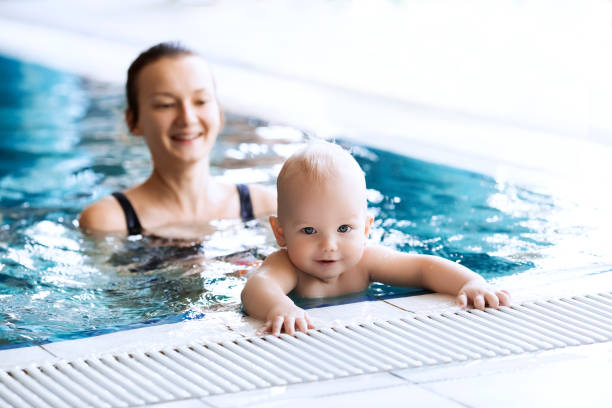A question we’re often asked is: when can babies start swimming lessons? Considering that so many Australians live within 50km of a beach, swimming lessons are therefore important, but knowing at what age a child should start learning to swim can be confusing. We’ll explore the topic in detail in this blog.
Research by Royal Life Saving Australia found that in 2018/19, 19 children aged 0-4 drowned in the country, which was a 12% increase on the previous year. Even though babies spend around nine months surrounded by liquid in the womb, swimming is not a natural activity for humans. It requires a lot of time and effort for humans to gain the skills to even tread water, so starting at a relatively young age with swimming lessons is a great idea.
But at what age should you start? Search the internet and you’ll find many different opinions on which age is best, which doesn’t really help you to make a decision. While newborns don’t yet have the fine-motor skills necessary to tread water or do freestyle, the main goal of swimming lessons for babies is to get them familiar with the water. It’s also an ideal time for parents to bond with their babies, and even for parents to gain a refresher in important aspects of water safety.
An added benefit of young children learning to swim is that many achieve physical-, cognitive- and language-development milestones earlier than those children who don’t receive lessons. Swimming is also one of the best ways for people to get exercise, so gaining these swimming skills at a young age will serve them well as they journey into adulthood.
The American Academy of Pediatrics states that children over one year of age can benefit greatly from swimming lessons, particularly if they are coupled with lessons in the awareness of water hazards and being aware of one’s own limitations in the water. Life Saving Victoria discovered that around 39% of Grade 6 students did not have adequate knowledge of water safety, equating to around 25,000 children moving into high school who lack “sufficient knowledge to avoid getting into dangerous situations in and around water.”
It’s important to note that swimming lessons alone cannot prevent children (or even adults) from drowning, so children should always be properly supervised when in the water.
Are you ready to start your little one’s journey in the water? Contact us today or enrol online!


